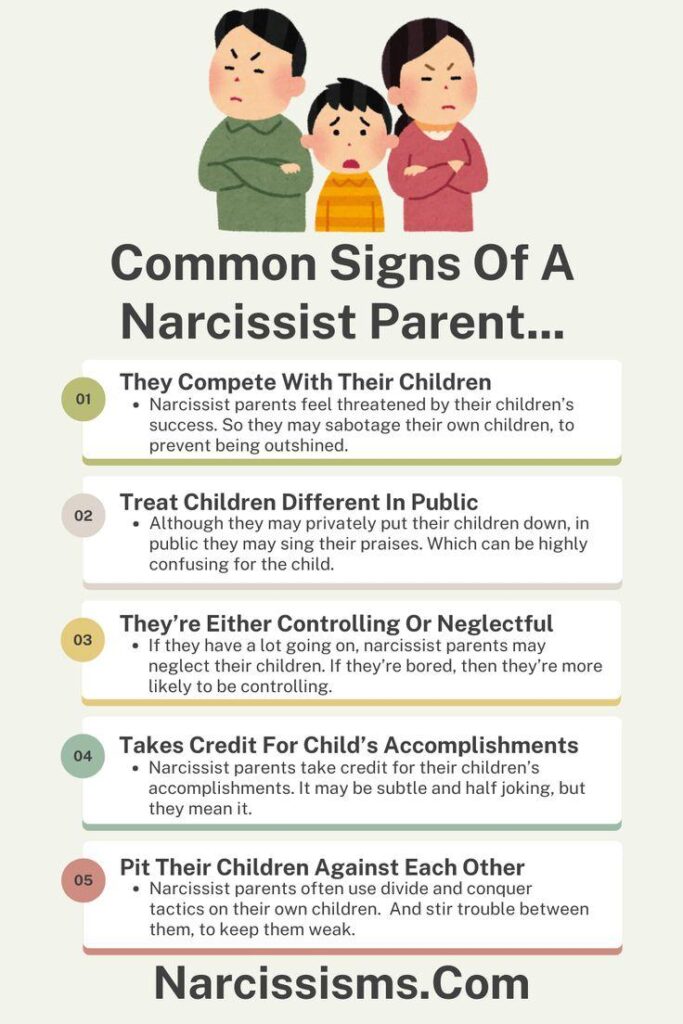When it comes to parenting, most of us imagine a world filled with love, encouragement, and support. But sometimes, beneath the surface, family dynamics can be more complicated—especially when narcissistic tendencies take root. Narcissistic parenting is a challenging pattern that can leave lasting impacts on children’s emotional well-being, often going unnoticed because the signs are subtle or mistaken for typical family behavior. If you’ve ever felt dismissed, controlled, or constantly under pressure to meet impossible expectations at home, it might be time to take a closer look. In this article, we’ll gently explore what narcissistic parenting looks like, helping you recognize the signs so you can better understand your experience — or support someone who might be navigating this difficult terrain.
Table of Contents
- Understanding the Emotional Impact of Narcissistic Parenting
- Recognizing Manipulative Behaviors That Undermine Your Confidence
- Creating Healthy Boundaries to Protect Your Wellbeing
- Seeking Support and Healing Beyond the Home Environment
- The Conclusion
Understanding the Emotional Impact of Narcissistic Parenting
Children raised under narcissistic parenting often experience a complex web of emotions, frequently feeling invalidated and unseen. This lack of genuine emotional connection can lead to deep-seated insecurities, as their feelings are often dismissed or overshadowed by the parent’s relentless need for admiration. Over time, this dynamic fosters a persistent sense of unworthiness, leaving children to wrestle with internalized doubt and self-criticism.
Beyond individual self-esteem struggles, the emotional fallout frequently extends into their relationships and social lives. The constant pressure to meet unrealistic expectations can cause anxiety, fear of failure, and difficulty setting healthy boundaries. Signs to watch for include:
- Chronic people-pleasing behaviors
- Fear of expressing true feelings
- Struggles with trust and intimacy
- Heightened sensitivity to criticism
Recognizing Manipulative Behaviors That Undermine Your Confidence
Manipulative behaviors often disguise themselves as concern or guidance but gradually chip away at your self-esteem. When a parent consistently belittles your achievements or dismisses your feelings, it’s a subtle form of control that undermines your confidence. These actions may include gaslighting, where your memories and perceptions are invalidated, or using guilt to shape your choices. Recognizing these tactics is crucial, as they foster a constant internal doubt that you’re never quite good enough, which children of narcissistic parents painfully know all too well.
Look out for patterns where your thoughts and emotions are minimized or redirected to serve the parent’s ego. Sometimes, this appears as exaggerated criticism masked as “tough love” or constant comparisons designed to keep you insecure. Typical signs include:
- Being blamed for their moods or failures
- Excessive control disguised as protection
- Withholding affection unless you meet their expectations
- Invalidation of your personal experiences or preferences
Understanding these behaviors helps you reclaim your voice and rebuild a healthy sense of self-worth, even in the face of such challenging dynamics.
Creating Healthy Boundaries to Protect Your Wellbeing
Setting clear limits is essential for maintaining your emotional and mental health, especially when navigating relationships shaped by narcissistic parenting. It means acknowledging your needs as valid and deserving of respect. Establishing these boundaries allows you to protect your inner peace and foster an environment where your voice is heard. Remember, boundaries are not walls to shut others out but gates to guard your wellbeing.
Here are some practical ways to start creating healthy boundaries:
- Identify your triggers: Recognize situations or behaviors that cause distress or discomfort, and prepare to address them calmly.
- Communicate assertively: Use “I” statements to express your feelings and limits without blame or anger.
- Practice self-care: Prioritize activities that replenish your spirit and reduce stress, reinforcing your emotional reserves.
- Seek support: Connect with trusted friends, therapy groups, or professionals who understand the complexity of narcissistic dynamics.
By nurturing these boundaries consistently, you’ll begin to reclaim control, granting yourself the freedom to heal and thrive beyond the shadows of toxic parenting patterns.
Seeking Support and Healing Beyond the Home Environment
Escaping the grasp of narcissistic parenting often requires more than just physical distance from the home environment; it demands intentional steps toward emotional recovery and well-being. Finding safe spaces outside the home—whether in therapy groups, supportive friendships, or community centers—can be transformative. These spaces offer validation, understanding, and an opportunity to rebuild self-worth that may have been eroded over time. Remember, healing is a journey, and connecting with others who have faced similar challenges can provide comfort and strength.
Beyond professional help, consider integrating practices into daily life that nurture your emotional health. This may include:
- Journaling to process your thoughts and feelings without judgment.
- Mindfulness or meditation techniques to reconnect with your inner self.
- Engaging in creative outlets that foster self-expression and joy.
- Setting boundaries that protect your emotional space in all relationships.
By acknowledging the need for support and actively cultivating healing outside your home, you foster resilience and empower yourself toward a brighter, more balanced future.
The Conclusion
Recognizing the signs of narcissistic parenting can be challenging, especially when it comes from someone you love and depend on. But becoming aware is the first step toward healing and creating healthier boundaries for yourself and future generations. Remember, you’re not alone in this journey, and support is available. By understanding these patterns, you can begin to reclaim your sense of self and build relationships rooted in respect and genuine care. Take your time, be gentle with yourself, and know that growth and change are always possible.

